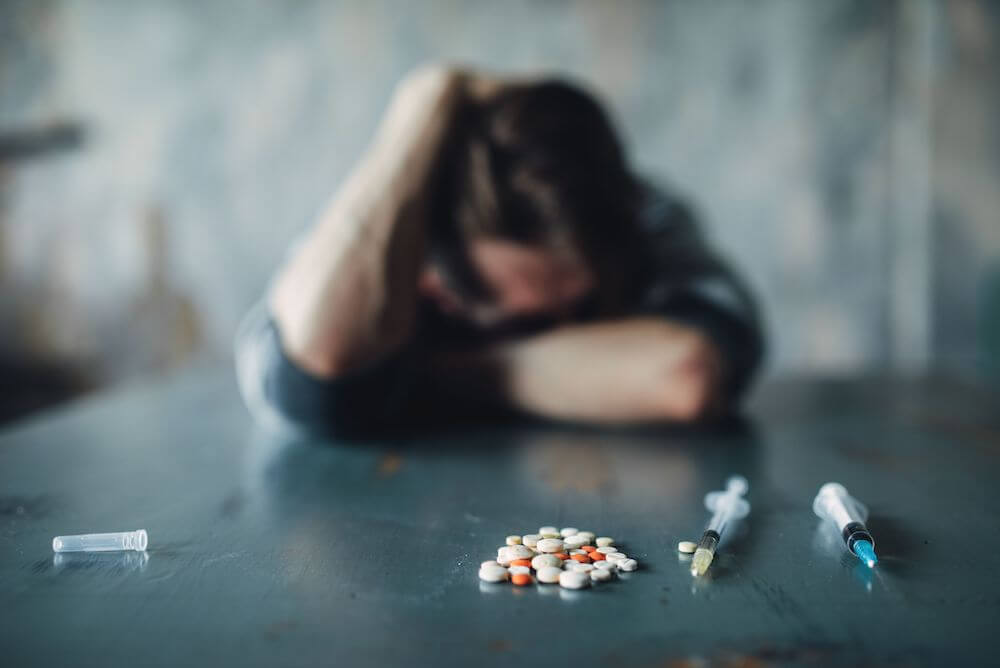Drug Addiction
Home » What We Treat »
What is Substance Abuse / Drug Addiction?
Addiction has long been thought to be a term used to describe someone who consciously chooses to use drugs despite the negative consequences it causes within their lives. And while many people still believe that addiction is a choice, science has proven that it is anything but. Addiction, as defined by the National Institute of Drug Abuse (NIDA), is a chronic, relapsing disease of the brain that is characterized by compulsive drug seeking and use despite harmful consequences. Addiction is a chronic disease, meaning that it occurs continuously, and while it can be treated, it cannot be cured.
When something is classified as a “disease”, it means that the physical construct of an organ or its function becomes altered. A person who is abusing drugs regularly is impacting the overall function of their brain because they are introducing a substance to their bodies that begins to take on the responsibility of otherwise natural systems. This is most obvious in relation to dopamine, a neurotransmitter in the brain that produces sensations of reward and pleasure. Drugs interact with these specific receptors and essentially overload them. Over time, dopamine receptors stop naturally releasing dopamine, but instead allow the drugs that are being abused to take over that function. Because drugs are now responsible for producing and releasing dopamine, the drug user has to continually use in order to feel any sense of pleasure. One of the many downsides to that is that the body develops tolerance, meaning that the user has to continually increase the amount of drugs they are using in order to feel satisfied.

How is it Drug Addiction Treated?
Addiction is a disease that someone will live with for the rest of their lives, because as mentioned before, it cannot be cured. However, addiction is a highly treatable disease and those who have it can develop skills to keep their active addiction dormant.
This specific disease is most generally treated using a comprehensive approach that includes the use of both therapy and medication. Individuals who are addicted to drugs can work with therapists, addiction specialists, and other healthcare professionals at Los Angeles drug rehab centers to identify and address the core issues related to their active addiction and develop a plan on how to treat those issues. This includes developing an individualized treatment plan involving both general and specific therapies designed to meet the needs of the patient. For example, someone who developed a drug addiction after experiencing a significant traumatic event will likely have one or more trauma-based therapies included into the makeup of their treatment plan. All patients receiving professional addiction treatment services will have individual therapy sessions, and, depending on the level of care they are obtaining, group counseling, behavioral therapy, and possibly family therapy.
Not every drug addict is at their rock bottom when they enroll in a treatment program, which is one of the reasons why there are several different levels of addiction treatment available. They include:
- Inpatient treatment (also known as residential treatment)
- Partial hospitalization programs
- Intensive outpatient programs
- Outpatient treatment
Within each of these levels of treatment, patients can also receive prescription medication developed to help with withdrawal symptoms and cravings (if medically indicated) as well as other medications to help treat co-occurring mental health conditions.
Statistics
The most recent data provided by the National Center for Drug Abuse Statistics concludes that:
- 53 million people in the United States had used illegal drugs or misused prescription drugs
- Marijuana is the most widely abused drug in the country, followed by opioids, meth, and heroin
- Drug overdose deaths involving synthetic opioids increased by 10% between 2017 and 2018
- 47% of high school students had used an illegal drug before the time of their graduation
- 70% of people who try an illegal drug prior to 13 years of age develop a substance use disorder within at least seven years
- The Poison Control Centers of America reported 5,300 calls regarding child exposure to opioids
While many statistics regarding drug addiction highlight how grim this disease can be, the Centers for Disease Control and Prevention (CDC) reported that there was a 2.9% decline in drug overdose deaths between 2018 and 2019.
Signs and Symptoms
A drug addiction is extremely difficult to conceal, especially as the drug addiction gets worse. It is important to remember that not all drug addicts are the same, nor do they all experience the exact same symptoms. However, some of the most common signs and symptoms of drug addiction include the following:
- Needing more of a drug in order to experience the sense of being high
- Continuing to use drugs despite experiencing health, social, financial, professional, or personal consequences caused by use
- Experiencing withdrawal symptoms when unable to use
- Engaging in dangerous activity while under the influence, such as driving a vehicle, having unprotected sex, or getting in physical arguments
- Socially isolating from friends and family
- Ignoring basic hygiene practices such as brushing teeth, washing clothes, combing hair, etc.
- Being dishonest about money or stealing it from others to pay for drugs
- Changes in sleeping and eating patterns
- Using other drugs to help counteract the effects of another drug
- Neglecting basic responsibilities in order to use instead
- Experiencing sudden, unexplained mood swings
These are just some of many signs and symptoms of drug addiction. If you are concerned that you or someone you love is addicted to drugs, Hathaway can help.
Treatment at Hathaway
Los Angeles drug rehab centers offer several different levels of addiction treatment, including:
- Detox
- Residential treatment
- Intensive outpatient program
- Outpatient treatment
- Continuing care
We utilize countless evidence-based therapies and approaches to help each patient establish a strong footing in recovery. These include, but certainly aren’t limited to, the following:
- Biofeedback
- Art therapy
- Cognitive behavioral therapy (CBT)
- Dialectical behavioral therapy (DBT)
- EMDR
- Exposure therapy
- Family therapy
- Motivational interviewing
- Psychodynamic therapy
- Group counseling
- Individual psychotherapy
Our team of certified and licensed professionals working at Los Angeles drug rehab centers can develop an individualized treatment plan for you or your loved one that focuses on your specific treatment needs. With our help and guidance, we can help you live a happy, healthy, recovered life.











